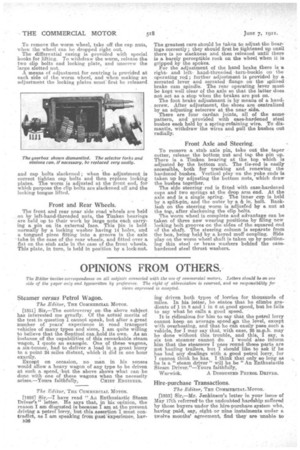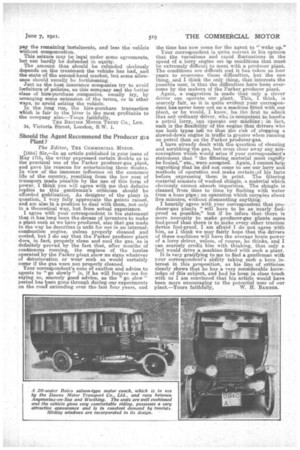OPINIONS FROM OTHERS.
Page 28

Page 29

If you've noticed an error in this article please click here to report it so we can fix it.
The Editor invites correspondence on all subjects connected with, the use of commercial motors. _Letters should be on one gide of the 2.--a per only and typewritten by preference. The right of abbreviation is reserved, and no responsibility for views expressed as accepted.
Steamer versus Petrol Wagon.
The Editor, THE COMMERCIAL MOTOR.
[1851] Sir,—The controversy on the above subject has interested me greatly. Of the actual merits of the test in question I cannot speak, but after a great number of years' experience in road transport vehicles of many types and sizes. I am quite willing to believe that the Sentinel can ;hold its own. As an instance of the capabilities of this remarkable steam wagon I quote an example. One of these wagons, a sixaeonner, had to deliver a load in ,a great hurry to a point 24 miles distant, which it did in one hour exactly. Except on occasion, no man in his senses would allow a heavy wagon of any type to be driven at such a speed, but the above shows what can be done with one of these wagons when the necessity arises.—Yours faithfully, CHIEF ENGINEER.
The Editor, THE COMMERCIAL MOTOR.
[1852] have read "r Aa. Enthusiastic Steam
Driver's" letter: He says that, in his Opinion, the reason I am disgusted is bemuse I am at the present driving a petrol lorry, bait this assertion I must contradict, as I am speaking from Paarexperience, hav h36
ing driven both types of krries for thousands of miles. In. his letter, he etates that he climbs gradients of 1 in 8 and 1 in 6 at good speed, but he fails to say what he calls a good speed.
It is ridieulaus for him to say that the petrol lorry cannot keep an average speed ion the level, except with overheating, and that he can easily pass such a vehicle, for I may say that, with ease, 25 m.p.h. may be done without this trouble, and this, I say, a six ton steamer cannot de. I would also inform him that the steamers I pass round these parts are not hauling trailers, but I should like to ask if he has had any dealings with a good petrol lorry, for I cannot think he has. I think that only SO long as he is a "steam driver" will he be "An Enthusiastic Steam Driver."—Yours faithfully,
Warwick. A DISGUSTED PETROL DRIVER.
Hire-purchase Transactions.
The Editor, THE COMMERCIALMOTOR. [18.53] Sir,—Mr. tlenkinson's letter in your issue of May 17th referred to the undoubted hardship suffered by those buyers under the hire-purchase system who, having paid, say, .eight or nine instalments under a twelve months' agreement, find they are unable to Pay the remaining instalments, and lose the vehicle without oompensation.
This seizure may be legal under some agreements, but can hardly be defended in equity. The amount that should be refunded obviously depends on the treatment the vehicle has had, and the state of the second-hand market, but some allowance should usually be forthooming. Just as the beat insurance companies try to avoid forfeiture of policies, so this oempany and the better class of hire-purchase companies, usually try, by arranging some extension Of the terms, or in other ways, to avoid seizing the vehicle. In the long run, the hire-purchase transaction which is fair to the hirer is the most profitable to • the company also.—Yours faithfully,
THE BRITISH MOTOR TRUST CO., LTD. 34, Victoria Street, London, 5. W. 1.
Should the Agent Recommend the Producer gas Plant?
The Editor, THE COMMERCIAL MOTOR.
[1854] Sir,—In an article published in your issue of May 17th, the writer expressed certain doubts as to the practical use of the Parker producer-gas plant, and gave his reasons for entertaining these doubts. In view of the immense influence on the economic life of the country, resulting from the low cost of transport made possible by the use of this form of power, I think you will agree with me that definite replies to this gentleman's criticism should be afforded publication. As designer of the plant in question, I very fully appreciate the points raised, and am also in a position to deal with them, not only in a theoretical way, but from actual experience. I agree with your correspondent in his statement that it has long been the dream of inventors to make a plant such as we have produced, also that gas made in the way he describes is unfit for use in an internalcombustion engine, unless properly cleaned and cooled, but I do say that the Parker producer plant does, in fact, properly clean and cool the gas, as is definitely proved by the fact that, after months of continuous running, the engines of the lorries operated by the Parker plant show no signs whatever of deterioration or wear such as would certainly occur if the gas were not properly cleaned. Your correspondent's note of caution and advice to agents to "go slowly" is, if he will forgive me -for saying so, scarcely good advice, as the "go GIoW" period has been gone through during our experiments on the road extending over the last four years, and the time has now come for the agent to " wake.up." Your correspondent is quite correct in his opinion that the variations and rapid fluctuations in the
speed of a lorry engine set up conditions that must be extremely difficult to meet with a producer plant. The conditions are difficult and it has taken us four years to overcome these difficulties, but the one thing, and I think Use only thing, that interests the possible user, is that the difficulties have been overcome by the makers of the Parker producer plant. Again, a suggestion is made that only a clever driver can operate our plant. This I think, is scarcely fair, as it is quite evident your correspon dent has never been out on a machine fitted with our plant, or he would, I know, be the first to admit that anSr ordinary driver, who is competent to handle
a petrol lorry, can operate our machine ; in fact, such is the flexibility of the engine that drivers who use both types tell us that the risk of stopping a slowed-down engine in traffic is greater when running on petrol than on the Parker producer-gas.
I have already dealt with the question of cleaning and scrubbing the gas, but must clear away any mis conception which would arise if your correspondent's statement that "the filtering material must rapidly be fouled," etc., were accepted. Again, I cannot help regretting that he did not come to see our lorry and methods of operation and make certain of his facts before expressing them in print. The filtering
material consists of washed shingle, a material which obviously cannot absorb impurities. The shingle is cleaned from .tame to time by flushing with water from a. hose pipe ; an operation which occsipies about five minutes, without dismantling anything.
I heartily agree with your correspondent that producer-gas plants "will have to be as nearly fool proof as possible," but if he infers that there is more necessity to make producer-gas plants more fool-proof than there is to make every other traction device fool-proof, I am afraid I do not agree with him, as I think we may fairly hope that the drivers of these machines will have the average brain power of a lorry driver, unless, of course, he thinks, and I can scarcely credit biro with thinking, that only a fool would drive a machine fitted with such a plant. It is very gratifying to me to find a gentleman with your correspondent's ability taking such a keen in terest in this proposition, as his line of criticism
clearly shows that he has a very considerable knowledge of this subject, and had he been in close touch
with us I am convinced that his article would have been more encouraging to the potential user of our
plant.—Yours faithfully, W. H. BAleIBER.
































